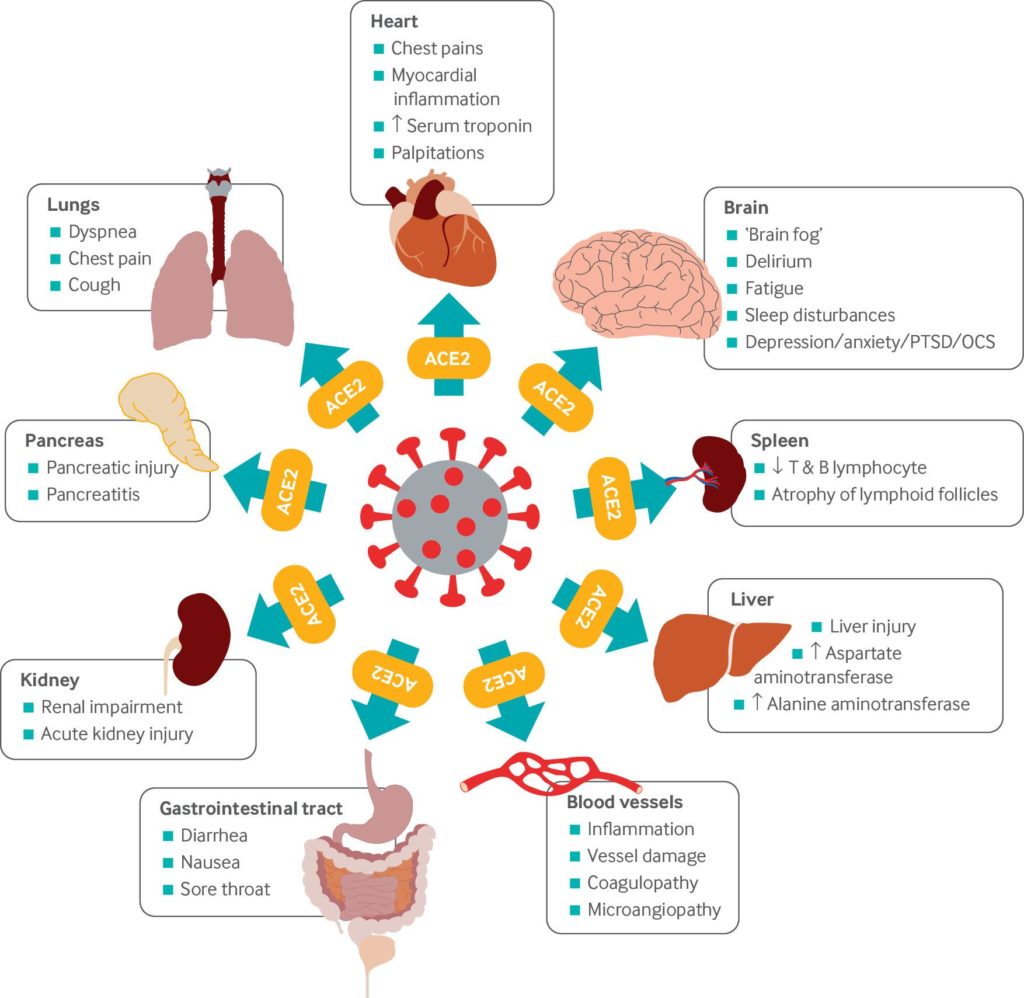
Headache and “brain fog” may persist after COVID-19 infections
With the availability of vaccines and new treatments against COVID-19, the risk of serious outcomes, like death, is significantly lower than it was two years ago. Add in the elimination of most public health restrictions and it may feel like we’re closer to the “end” of the pandemic (however defined) than the beginning. But overlooked among the falling fatality statistics and high (apparent) recovery rates from COVID-19 is the recognition that “long haul COVID” or just “long COVID” may be a long-term consequence of a COVID infection for millions.
We now know that almost 60% of the US population (including 75% of children and adolescents) has been infected with COVID-19 (as of February 2022). Last month Steven Novella gave a detailed update on the incidence and prevalence of long COVID. Today I want to review some of the treatments that are being studied for the treatment of long COVID.
Is there a definition of “long” COVID?
The acute effects of COVID-19 infections typically last up to 4 weeks. In most cases, symptoms are fully resolved by 12 weeks. A working definition for long COVID (or post-acute sequelae of COVID-19 (PASC)) would be signs and symptoms that persist or develop after the acute effects of a COVID-19 infection. The UK’s National Institute for Health and Clinical Excellence (NICE) uses the term post-COVID 19 syndrome and gives the following definition:
Signs and symptoms that develop during or after an infection consistent with COVID‑19, continue for more than 12 weeks and are not explained by an alternative diagnosis. It usually presents with clusters of symptoms, often overlapping, which can fluctuate and change over time and can affect any system in the body. Post‑COVID‑19 syndrome may be considered before 12 weeks while the possibility of an alternative underlying disease is also being assessed.
In addition to the clinical case definitions, the term ‘long COVID’ is commonly used to describe signs and symptoms that continue or develop after acute COVID‑19. It includes both ongoing symptomatic COVID‑19 (from 4 to 12 weeks) and post‑COVID‑19 syndrome (12 weeks or more).
Steven Novella nicely summarized the largest study (to date) of PASC, which noted:
Among COVID-19 survivors (mean [SD] age: 46.3 [19.8], 55.6% female), 57.00% had one or more long-COVID feature recorded during the whole 6-month period (i.e., including the acute phase), and 36.55% between 3 and 6 months. The incidence of each feature was: abnormal breathing (18.71% in the 1- to 180-day period; 7.94% in the 90- to180-day period), fatigue/malaise (12.82%; 5.87%), chest/throat pain (12.60%; 5.71%), headache (8.67%; 4.63%), other pain (11.60%; 7.19%), abdominal symptoms (15.58%; 8.29%), myalgia (3.24%; 1.54%), cognitive symptoms (7.88%; 3.95%), and anxiety/depression (22.82%; 15.49%).
Steve also highlighted evidence suggesting that the different variants may be causing different long COVID symptoms.
Since the initial identification of long COVID, our knowledge base has progressed, and what it suggests is concerning. Long COVID is common, and may last for several months in about one-third of those infected. Long COVID is possible even after mild infections, and in people who have no underlying health conditions. Brain imaging confirms that COVID causes objective changes. Whether or not those changes are permanent is unclear. The symptoms reported can be wide-ranging, and include:
Respiratory symptoms
- Breathlessness
- Cough
Cardiovascular symptoms
- Chest tightness
- Chest pain
- Palpitations
Generalised symptoms
- Fatigue
- Fever
- Pain
Neurological symptoms
- Cognitive impairment (‘brain fog’, loss of concentration or memory issues)
- Headache
- Sleep disturbance
- Peripheral neuropathy symptoms (pins and needles and numbness)
- Dizziness
- Delirium (in older populations)
- Mobility impairment
- Visual disturbance
Gastrointestinal symptoms
- Abdominal pain
- Nausea and vomiting
- Diarrhoea
- Weight loss and reduced appetite
Musculoskeletal symptoms
- Joint pain
- Muscle pain
Ear, nose and throat symptoms
- Tinnitus
- Earache
- Sore throat
- Dizziness
- Loss of taste and/or smell
- Nasal congestion
Dermatological symptoms
- Skin rashes
- Hair loss
Psychological/psychiatric symptoms
- Symptoms of depression
- Symptoms of anxiety
- Symptoms of post-traumatic stress disorder
This BMJ illustration demonstrates how COVID is not simply a respiratory disease:

Via BMJ. Multi-organ complications of COVID-19 and long COVID.
Therapies for long COVID
Assessment of patients with prolonged symptoms after a COVID-19 infection will consider past medical history, and will include standard blood work investigations. Imaging like X-rays may also be done, if there are respiratory issues. Evaluations will be guided by signs and symptoms, and should be conducted to rule out serious/life-threatening complications as well as to determine (if possible) the relationship to a COVID-19 infection. Unfortunately, no specific laboratory test can clearly distinguish long COVID from other conditions.
In most cases, self-management is appropriate and recommended. Self-monitoring at home may be appropriate for many, and could includes symptom diaries and measures like pulse oximetry and blood pressure, as appropriate. Given the variety of long COVID symptoms, management will be targeted based on findings. In some cases, multi-specialist referral and interprofessional assessment and rehabilitation programs may be appropriate. Therapies can include, but are not limited to:
Dietary Changes – There are no specific dietary changes shown to benefit long COVID. However, poor diet is a possible consequence of long COVID if sufferers feel terrible. The UK Dieticians Association recommends a balanced diet that supplies a variety of vitamins, minerals, protein, carbohydrates, fluid and fibre to help with recovery. For those suffering from a lost of smell or taste, the organization AbScent provides some tips on smell training and general resources on the recovery of taste and smell.
There is no evidence that specific supplements of vitamins (e.g., vitamin C, vitamin D, niacin/vitamin B3) or minerals can help with long COVID. As has been discussed numerous times on this blog, large doses of individual vitamins or minerals are not innocuous, but a standard multivitamin may be helpful in supporting nutrition when diets are poor.
There is some interest in a low histamine diet for long COVID. There is little evidence to support the benefits of a low histamine diet or an “anti-inflammatory diet” more generally, although this is an area of research, and anecdotal reports suggest that some find these diets beneficial.
Shortness of breath is commonly reported in long COVID. This tends to improve, but slowly. Breathing exercises may be prescribed and medication is sometimes necessary. Chest pain and discomfort can be a symptom of more serious conditions as well as long COVID. Anti-inflammatory drugs are occasionally appropriate, but have their own side effects. Persistent cough following COVID-19 is managed similarly to other post-viral cough conditions. Over-the-counter cough suppressants are not-well supported by evidence but may be helpful to some. Inhaled drugs, like the ones used to treat asthma, may also be used.
Long COVID fatigue can range from mild to severe. There is detailed guidance produced by the American Academy of Physical Medicine and Rehabilitation to inform treatment planning. It advocates an individualized and structured return-to-activity program with the goal of restoring activity and improving quality of life. A wide range of supplements have been suggested for fatigue, including omega fatty acids, vitamins, coenzyme Q10, and herbs such as ginseng and echinacea. Most of these products have been discussed more extensively in other posts on this blog, and there is little to no evidence they offer meaningful benefits. There is also an array of prescription drugs that have been suggested for long COVID based on experiences in the ME/CFS/chronic fatigue/SEID community. There is very limited evidence to support these products in either population. The same can be said for acupuncture for the treatment of fatigue, or any other long-COVID syndrome.
More research really is required
Treatment approaches to long COVID must be personalized to address the signs and symptoms of each case, as well as each patient’s preferences. While we are over two years into the pandemic, research into long COVID is just in its infancy. Given the number of people that will experience long COVID, and the potential cumulative disability in the population, the consequence of the pandemic will likely be felt for years, if not decades.

